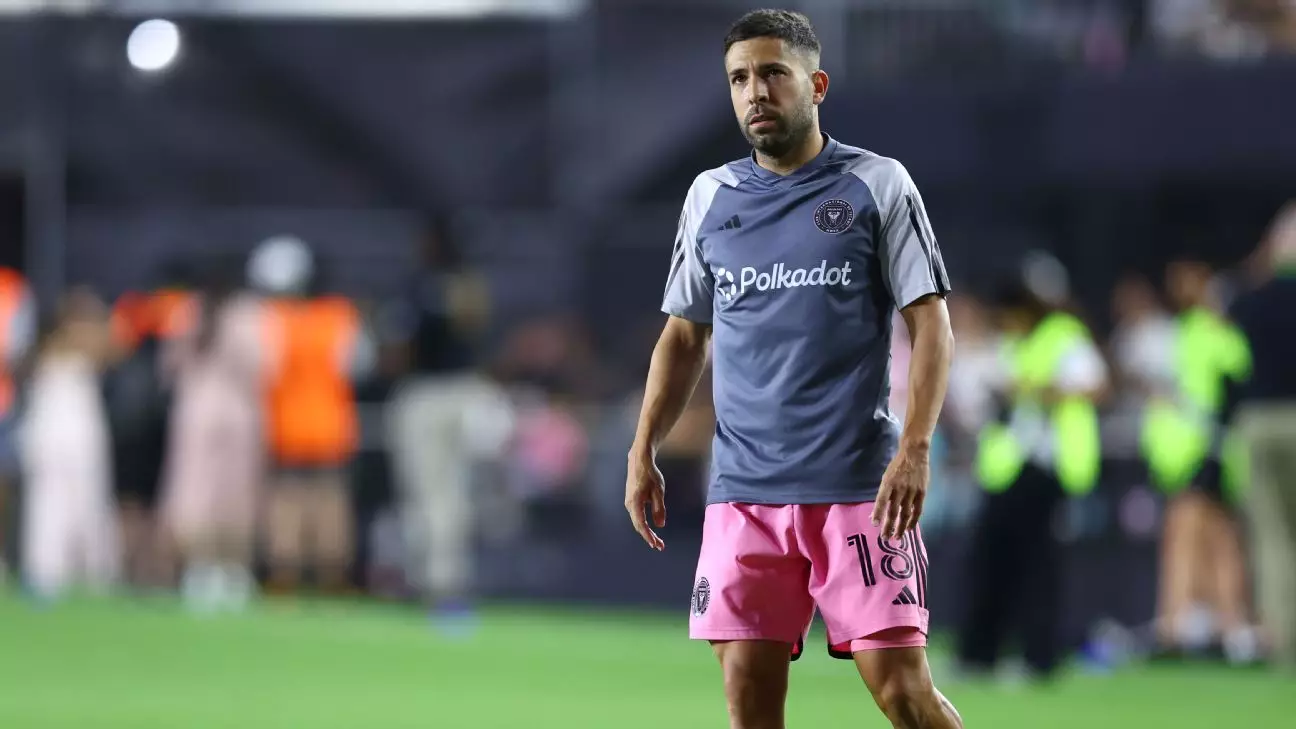Jordi Alba’s Reflections on MLS Playoff Format: A Call for Change
In the world of Major League Soccer, change is often met with resistance, but it’s also where growth begins. Recently, Jordi Alba, a new face in the league and a star player for Inter Miami, has sparked a conversation following his team’s exit from the playoffs. His candid reflections on the current postseason format have caught the attention of fans and analysts alike. After a nail-biting 3-2 loss to Atlanta United, Alba did not shy away from expressing his concerns, adding a fresh perspective to an ongoing debate.
For Alba, this was his first experience with MLS playoffs after a challenging season in 2023, where Inter Miami ended up in 14th place in the Eastern Conference. As someone who is no stranger to competitive formats in Europe, Alba’s insights offer a unique viewpoint on how MLS structures its postseason. His comments highlight what many see as inherent flaws in the system that may undermine the spirit of fair play and competitive balance.
It’s easy to empathize with Alba’s point of view. Describing the playoff setup as “unfair,” he critiqued the three-match series format used in the initial rounds. While acknowledging its historical roots, he suggested a shift towards a more traditional knockout format. In such a system, conference champions would face off directly, providing a clearer measure of talent and skill across the league. Alba’s proposal echoes sentiments shared by fans who feel that the current format can sometimes lead to unpredictable and skewed outcomes.
Key Takeaways
- Jordi Alba has initiated important discussions about MLS playoff fairness.
- A shift to traditional knockout formats could enhance competitive balance.
- The postseason structure impacts perceptions of team success and progress.
The Call for Change: Understanding Alba’s Perspective
Jordi Alba’s reflections go beyond just personal frustration; they address broader concerns about how games are won and lost. The existing format can often seem like a roll of the dice, heavily reliant on performance over short stretches rather than consistent excellence throughout the season. This sentiment resonates deeply within the soccer community, prompting questions about how tradition should balance with innovation in league structures.
Inter Miami’s journey through the 2024 season adds another layer to this conversation. The team finished as Eastern Conference leaders and claimed the Supporters’ Shield, marking an incredible turnaround from their previous year’s disappointments. Despite setting new records for points accumulated in a single season, they faced an early playoff exit—a stark reminder that regular-season success does not always translate into postseason triumphs. This disparity raises questions about what truly defines success in professional sports.

A Season of Contradictions
The story of Inter Miami’s season is one of contrasts—impressive statistics versus unexpected outcomes. Even with star players like Lionel Messi and Matías Rojas leading the charge, their quarterfinal defeat left fans contemplating what went wrong. Head coach Gerardo Martino captured this sentiment perfectly by declaring their 2024 campaign “not a success,” despite their regular-season achievements. It challenges us to rethink how we measure success—is it purely statistical, or does it require clutch performances when it matters most?
As Inter Miami heads into the offseason, these reflections become crucial for future planning. The offseason offers time to reassess goals and strategies for 2025. For Inter Miami, learning from playoff challenges is essential for identifying areas needing improvement both on and off the field. Tactical adjustments and strategic management decisions will be key to ensuring that high expectations are met with tangible results.
The Path Forward: Lessons and Strategies
The weight of expectations on high-profile teams like Inter Miami adds pressure not just to perform but to succeed in clinching titles. While acknowledging progress since last year, it’s imperative that this awareness translates into concrete actions aligned with club ambitions and fan hopes. Jordi Alba’s remarks serve as a catalyst for broader discussions about evolving MLS strategies to ensure that meritocracy prevails in postseason journeys.
This offseason presents a crucial opportunity—not only for Inter Miami but for Major League Soccer itself—to revisit and refine its approaches. Enhancing competitive fairness while remaining true to tradition can transform individual brilliance into collective championship glory. By harnessing past lessons, teams can better prepare for future challenges, ensuring that they are not only remembered for their regular-season prowess but also celebrated as champions.
Final Thoughts
Jordi Alba’s call for change is more than just a critique; it’s an invitation for dialogue within Major League Soccer. His insights encourage us to think critically about how postseason formats impact perceptions of fairness and success. As teams like Inter Miami reflect on their journeys and prepare for upcoming seasons, there’s hope that these discussions will lead to meaningful transformations across the league. In doing so, MLS can continue to grow into an arena where talent shines brightest when it truly counts.
MLS playoffs
Jordi Alba
Inter Miami
soccer strategy


Leave a Reply